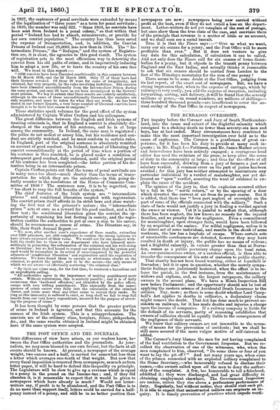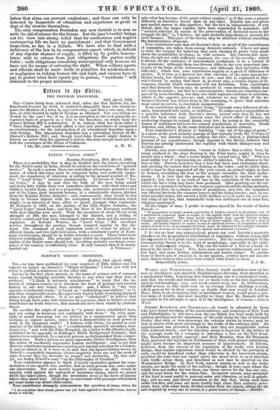THE BURRADON OVERSIGHT.
THE inquiry before the Coroner and. Jury of South Northumber- land, into the cause and extent of the frightful calamity which consigned to a chokino. death no fewer than seventy-six men and boys, has at last ended. Many circumstances have combined to make this the most important investigation ever held as to the cause of explosions. The Coroner is a. gentleman of great ex- perience, for it has been his duty to preside at many such in- quests ; in Mr. Hugh Lee Pattinson, and Mr. James Mather science and benevolence have been actively engaged ; a courageous local editor has used the criticism of the press, to keep alive the sense of duty in the community at large ; and thus far the efforts of all have been successful, drawing from a jury of farmers a just and salutary verdict. A common error on the part of juries has been avoided ; for this jury has neither attempted to incriminate any particular individual by a verdict of manslaughter, nor yet de- livered an " open " verdict, asserting the want of evidence to ex- plain the cause of the accident. The opinion of the jury is, that the explosion occurred either by a fall in the "north return," or by the opening of a door which diverted the current of air from its proper course. But it is added, that there has "been part neglect or oversight on the part of some of the officials connected, with the colliery." Such a state of facts would not justify a jury in finding a verdict against the owner or viewer. 'let it is painful to reflect that, although there has been neglect, the law knows no remedy for the injured families, and no penalty for the negligence. Even a commitment for manslaughter, upon stronger facts, would have been followed by an acquittal at the assizes. For wilful negligence, unless it is the direct act of some individual, and results in the detail' of some workman, the law has a loophole of escape. Where certain acts of unscientific carelessness are detected, however they may have resulted in death or injury, the public has no means of redress ; and a frightful calamity, in extent greater than that at Burra- don, comes as a public pecuniary charge upon the local rates. An over-parsimonious owner, or a careless official, is thus able to transfer the consequence of his acts of omission to public charity.
That charity has not been found wanting, either at Lundhill or Burradon ; but it is open to question, whether the merely sympa- thetic feelings are judiciously bestowed, when the effect is to re- lease the parish, in the first instance, from the maintenance of widows and orphans, and, as the largest ratepayers, the colliery owners in the second place. We have a Mines Inspection Bill now before Parliament; and the opportunity should not be lost of applying the modern science of Accidental Death Insurance to the colliers. Nay, more ; as there is some doubt whether Lord Camp- bell's Act applies to deaths in collieries, a declaratory clause might remove the doubt. That Act has done much to prevent ac- cidents on railways, for it has made deaths and injuries a charge upon the income of companies. If a railway company is liable for the default of its servants, parity of reasoning establishes that owners of collieries should be equally liable to the consequences of the negligence of their servants.
We know that colliery owners are not insensible to the neces- sity of means for the prevention of accidents; but we shall be still more assured if the more vulgar motive of self-interest be added.
The Coroner's Jury blames the men for not having complained of the foul ventilation to the Government Inspector. But we re- collect the observation of one of the witnesses, who, when the men complained to him, observed, "Do some three or four of you want to lay the pit off ? " And not many years ago, when some of the pitmen connected with an exploded colliery complained to the Home Seeretary,—who honourably refused to disclose their names,—the owners called upon all the men to deny the author- ship of the complaint. A few, too honourable to tell a falsehood, admitted it ; they were discharged, and had great difficulty in obtaining employment elsewhere. The Government Inspectors are useless, unless they rise above a perfunctory performance duty. Regularly, but without notice, they should yi.tot each pit. It is idle to expect that uni.nstritoted colliers can originate an in- quiry. It is timely prevention of practices which impede venti-
lation that alone can prevent explosions ; and these can only be detected by Inspectors of education and experience as great as that of the viewers themselves.
The only compensation Burradon can now furnish is to arm us with the aid of science for the future. But the jury's verdict brings out the view into strong relief that for carelessness and neglect endangering life we have no punishment ; and that Government inspection, so far, is a failure. We have also to deal with a deficiency of the law in its compensatory aspect, which, in default of any regular channel of supply, is filled up by public benevo- lence, only to release from just obligations the parties really liable; such obligations remaining unrecognized only because we have not the means of enforcing the right. When colliery agents and officials shall be made liable to penalties for misdemeanour, or negligence in risking human life and limb, and owners have to y in oket what their agents pay in person, " accidents " will
to the proper minimum.



























 Previous page
Previous page